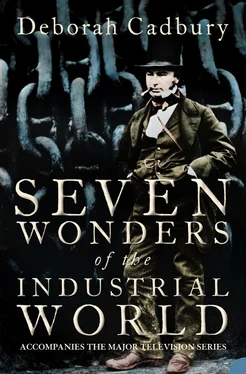By January 1856, Brunel had finally had enough. He voiced his concerns to the board of the Eastern Steam Navigation Company, reporting that a ‘large deficiency’ in iron ‘appeared to exist’ at the yard which was difficult to understand as ‘I do not now believe that any mistake has been intentionally made or even intentionally overlooked … and have been assured … that none of the iron so imported was ever knowingly used for other purposes … I make the quantity in the yard about 1,400 tons but this would still leave 800 or 900 tons to be accounted for and I am totally at a loss to suggest even a probable explanation.’ To make his position absolutely clear, he went on to say,
I have great cause to complain of neglect or to say the least of it of inattention to my orders and remonstrances. My instructions even when repeated frequently and formally in writing are much disregarded … Mr Russell, I regret to say, no longer appears to attend either to my friendly representations and entreaties or to my own formal demands and my duty to the company compels me to state that I see no means of obtaining proper attention to the terms of the contract otherwise than by refusing to recommend the advance of any more money.
Dark clouds were gathering over the shipyard. If Scott Russell were eventually made bankrupt, the Great Ship might belong to the creditors. A crisis was reached when Martin’s, Scott Russell’s bankers, refused to honour his cheques. Scott Russell laid off the workers in the yard, saying he could no longer continue with the work. The board of Eastern Steam, on Brunel’s advice, seized the Great Ship, stating that Scott Russell had breached his contract. The creditors were informed, the accountants moved in, and work on the Great Ship came to a complete stop.
The board submitted a claim on Scott Russell’s estate citing breach of contract, only to find there was no estate left on which they could claim. Brunel had been unaware that Scott Russell had mortgaged his yard and that there were a number of creditors, Beale and Co., the iron manufacturer, being the largest. Apart from the mounting debt and the missing iron, it emerged that although only about a quarter of the work had been completed on the hull, Scott Russell had somehow been paid £292,295. The board of Eastern Steam and its worried shareholders now found themselves in the hands of Martin’s Bank, which had prior claims. After much difficult discussion the bank acknowledged that Eastern Steam had rights too, and agreed to renew the lease of the shipyard – but just until August 1857.
Brunel was understandably worried. ‘I feel a much heavier responsibility now thrown upon me than I ever intended to take upon myself,’ he wrote. He still had Hepworth and Dickson from Scott Russell’s establishment to work with, and, better still, Daniel Gooch, a colleague and old friend involved in his railway commissions, was approved as his assistant. Scott Russell, however, was humiliated. ‘I intend to be very cautious and to keep every string which it devolves on me to pull, tightly in my own hands,’ Brunel told him. ‘It would therefore be in the position of an assistant of mine – that I should propose to engage your services.’
The last two years had been immensely difficult for Brunel as he tried to bring his work of creative genius to fruition. The burden of organising such a vast project against such a fraught background was beginning to exact a price. He had taken liberties all his life with his strong constitution and robust health, ignoring warnings, winning glory and generally taking life at a gallop, but now the rumour spread that he was ill. With little over a year left in which to launch his Great Ship before the bank took control of the yard, Brunel was facing the supreme test of his entire career.
‘Where is man to go for a new sight?’ asked The Times in April 1857. ‘We think we can say. In the midst of that dreary region known as Millwall, where the atmosphere is tarry, and everything seems slimy and amphibious, where it is hard to say whether the land has been rescued from the water or the water encroached upon the land … a gigantic scheme is in progress, which if not an entire novelty, is at as near an approach to it as this generation is ever likely to witness.’ The excitement was tangible; with Brunel in complete charge work progressed so well that by June the ship was almost ready for launching. The Great Eastern had become the talk of Europe.
However, the optimism of the summer dissolved as endless difficulties connected with the launch arose. After much negotiation, a new launch date was agreed with Martin’s Bank for October 1857. If the ship was not in the Thames by this date, the creditors would claim the yard and ‘we will be in the hands of the Philistines,’ declared company secretary John Yates. The fifth of October arrived and Brunel, not satisfied that everything was ready for the launch, had no alternative but to defer the date once again. The mortgagees seized the yard and refused access to all working on the ship. The situation had become impossible. Brunel was now put under immense pressure to agree to launch on the next ‘spring tide’ of 3 November and the company was charged large fees for the delay.
As the Great Ship stood helplessly inert, waiting at the top of two launch-ways, her brooding shape invited much comment. Many thought she was unlaunchable and would rust where she was. Other wise ‘old salts’ predicted that if she ever did finally find the sea, the first wave would break her long back in half. Brunel never doubted; but no matter how carefully he planned the coming operation, there were still many unknowns and little time to test the equipment. In the small hours of the cold autumn nights it seemed he was attempting the impossible. He was proposing to move an unwieldy metal mountain more than four storeys high down a precarious slope towards a high tide with untried equipment.
The plan for launching the ship sounded simple. Hydraulic rams would gently persuade her down the launch-ways. Tugs in the river, under the command of Captain Harrison, could also ease her towards the river, and there were restraining chains to hold her back should she move too fast. Two wooden cradles, 120 feet wide, were supporting the ship and they rested on launch-ways of the same width. Iron rails were fixed to the launch-ways and iron bars 1 inch thick were attached to the base of the cradles and both surfaces were greased to enable the vessel to slide easily down the launch-way gradient.
As the spring tide of 3 November approached, work on the ship became more frenzied. At night, 1,500 men working by gaslight carried on with last minute instructions from Brunel. Brunel himself never left the yard, sleeping for a few hours when exhausted on a makeshift bed in a small wooden office. He issued special instructions to everyone involved with the launch, saying:
The success of the operation will depend entirely upon the perfect regularity and absence of all haste or confusion in each stage of the proceedings and in every department, and to attain this nothing is more essential than perfect silence . I would earnestly request, therefore, that the most positive orders be given to the men not to speak a word, and that every endeavour should be made to prevent a sound being heard, except the simple orders quietly and deliberately given by those few who will direct.
Unfortunately for Brunel, perfect silence was not a high priority with the board of the Eastern Steam Navigation Company. For months now, the company had borne the disastrous haemorrhage of enormous amounts of money into the Great Ship. The launching presented them with a small chance to recoup some of those losses. Unknown to Brunel, they had sold over 3,000 tickets to view the launch from Napier shipyard. Newspapers, too, had played their part, informing the public that an event worthy of comparison with the Colosseum was about to take place at Millwall. ‘Men and women of all classes were joined together in one amicable pilgrimage to the East,’ reported The Times . ‘For on that day at some hour unknown, the Leviathan was to be launched at Millwall … For two years, London – and we may add the people of England – had been kept in expectation of the advent of this gigantic experiment, and their excitement and determination to be present at any cost are not to be wondered at when we consider what a splendid chance presented itself of a fearful catastrophe.’
Читать дальше












